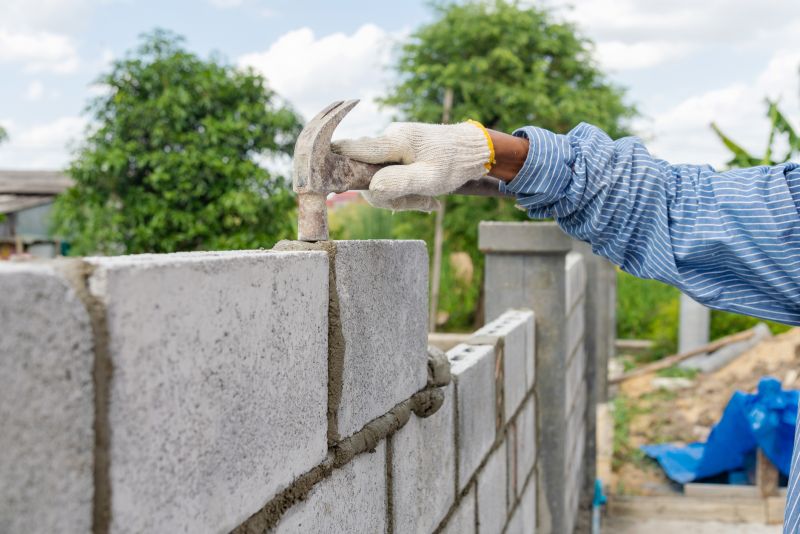Favorite Products For Efficient Block Work Repairs
Browse through highly recommended tools and materials that simplify block repair processes and enhance structural integrity.
 Block work repairs are an essential aspect of maintaining the structural integrity and aesthetic appeal of masonry projects. When cracks, chips, or damage occur in concrete blocks or brickwork, selecting the right products ensures effective and durable repairs. Various tools and materials are available to address different types of damage, from small cracks to larger structural issues. Understanding the types of repair products and their applications can help homeowners and professionals achieve optimal results.
Block work repairs are an essential aspect of maintaining the structural integrity and aesthetic appeal of masonry projects. When cracks, chips, or damage occur in concrete blocks or brickwork, selecting the right products ensures effective and durable repairs. Various tools and materials are available to address different types of damage, from small cracks to larger structural issues. Understanding the types of repair products and their applications can help homeowners and professionals achieve optimal results.
Top Overall Option
Multi-Purpose Masonry Repair Compound
This versatile repair compound is suitable for filling cracks, chips, and holes in various masonry surfaces. It offers good adhesion, ease of application, and durable results, making it a reliable choice for both small and large repairs.
Types of Products For Block Work Repairs
Masonry Patch and Repair Putty
Ideal for filling small cracks and chips in bricks and concrete blocks, providing a smooth finish.
Hydraulic Cement
Used for quick-setting repairs to stop leaks and reinforce damaged masonry structures.
Polymer-Modified Mortar Mix
A flexible mortar suitable for bonding new masonry to existing structures and repairing larger areas.
Epoxy Masonry Repair Kit
Contains epoxy resin for bonding and filling cracks, especially useful for structural repairs.
Sealant and Masonry Caulk
Provides waterproof sealing for joints and cracks in masonry surfaces.
Pointing Trowel Set
A set of tools designed for precise application of mortar and repair compounds into joints.
Concrete Restoration Grout
Used to fill voids and restore the integrity of concrete block structures.
Reinforcement Mesh
Provides added stability for large repairs and crack bridging in masonry.
Bonding Agent for Masonry
Enhances adhesion between old and new masonry materials during repairs.
Fast-Set Repair Mortar
A quick-curing mortar for urgent repairs requiring minimal downtime.
Popular Choices
Widely used for filling cracks and small holes, suitable for various masonry types.
Popular for sealing leaks and repairing damaged masonry surfaces quickly.
Favored for its flexibility and strong bonding properties in repair projects.
Trusted for structural crack repairs due to its high bonding strength.
Popular for sealing joints and preventing water infiltration.
A common tool for precise joint filling and finishing.
Convenient for small to medium repairs in concrete blocks.
Used to add strength to large or deep repairs.
Prepares surfaces for better adhesion of repair compounds.
Ideal for urgent repairs requiring quick stabilization.
Provides a durable, flexible seal for joints and cracks.
Popular for restoring structural integrity in masonry cracks.
Repairing block work involves more than just filling gaps; it requires products that can bond well with existing masonry, withstand environmental conditions, and provide a seamless finish. Commonly used materials include specialized patching compounds, mortar mixes, and sealants designed for masonry. In addition to repair materials, tools such as trowels, pointing tools, and mixing buckets are essential for proper application. The choice of products often depends on the extent of damage, the type of masonry, and the desired longevity of the repair.
Proper preparation is key to successful repairs. This includes cleaning the damaged area thoroughly, removing loose debris, and sometimes dampening the surface to improve adhesion. Applying the right product with precision ensures that repairs blend in naturally and maintain the structure's stability. For larger or more complex repairs, it may be necessary to use reinforcement meshes or specialized bonding agents to enhance strength.
Selecting the appropriate products for block work repairs involves considering factors such as drying time, ease of use, compatibility with existing materials, and weather resistance. Whether performing a minor touch-up or a major restoration, using quality repair products can make a significant difference in the durability and appearance of the finished work. Investing in the right tools and materials is crucial for achieving professional-looking results that stand the test of time.
Key Buying Considerations
- Type of damage and extent of repair needed
- Compatibility with existing masonry materials
- Drying and curing times to fit project timelines
- Ease of application, especially for DIY projects
- Bond strength and adhesion quality
- Weather resistance and durability of the product
- Flexibility of repair compounds to accommodate movement
- Waterproofing capabilities for outdoor repairs
- Ease of mixing and handling of repair materials
- Size and coverage area of the product
- Compatibility with tools and application methods
- Environmental conditions during application
- Cost-effectiveness and overall value
- Presence of any additional reinforcement options
- Manufacturer recommendations and product reviews
